How Consulting Businesses Are Adapting to AI in 2025
It’s no secret that AI is becoming a key tool for small businesses in Australia in 2025. From content generation to delivering data insights, AI is slowly but surely transforming the way that Aussie SMEs do business.
To better understand this shift, BizCover surveyed 965 small businesses as part of The Australian Small Business AI Report 2025. This special report included 196 businesses from the consulting sector.
“Consultants are known for their strategic mindset, so it’s no surprise that the data shows they’re leaning into AI as both a productivity tool and a competitive advantage,” says Sharon Kenny, Head of Marketing at BizCover. “But they’re embracing AI’s potential without losing sight of the human expertise that defines great consultancy work.”
The below report details findings from 196 businesses in the consulting sector, giving a rounded view on their stance towards AI, alongside commentary from Sharon Kenny.
Key takeaways:
- High AI adoption: 90% of consulting businesses currently use AI or plan to within two years, showing strong and growing uptake.
- Task vs. role replacement: 54% believe AI can replace specific tasks but only 12% expect it to replace full job roles, indicating AI is seen more as a tool than a job displacer.
- Preference for AI over outsourcing: 59% of consulting firms would consider using AI tools instead of hiring or outsourcing, signalling a shift in resource management approaches.
- Skill evolution: 68% expect AI to create demand for entirely new skills in consulting over the next 3–5 years, highlighting a strong focus on workforce upskilling and adaptation.
- Positive sentiment: 73% of consultants feel optimistic about AI’s potential to enhance productivity and support strategic work, reflecting readiness to embrace AI as a partner.
AI adoption in the consulting sector: Current usage and trends
AI adoption in the consulting sector is already deeply embedded. 90% of small consulting businesses are either already using AI or planning to adopt it within the next two years. Among those, 79% report using AI some or all of the time, which shows the increasing importance of AI in everyday consulting operations.
The consulting sector has the second-highest uptake rate of AI adoption and intent, sitting just behind the marketing sector (97%).
However, not all consulting businesses are on board. 10% of respondents say they have no plans to implement AI, pointing to concerns around privacy, data protection and cybersecurity as key barriers.
These concerns reflect a broader industry focus on the sensitivity of client data and the need for governance and oversight when introducing emerging technologies.
“Consultants have recognised the competitive edge that AI can give them. But just as importantly, they’re still carefully weighing the risks, especially when it comes to client confidentiality and trust,” says Kenny.
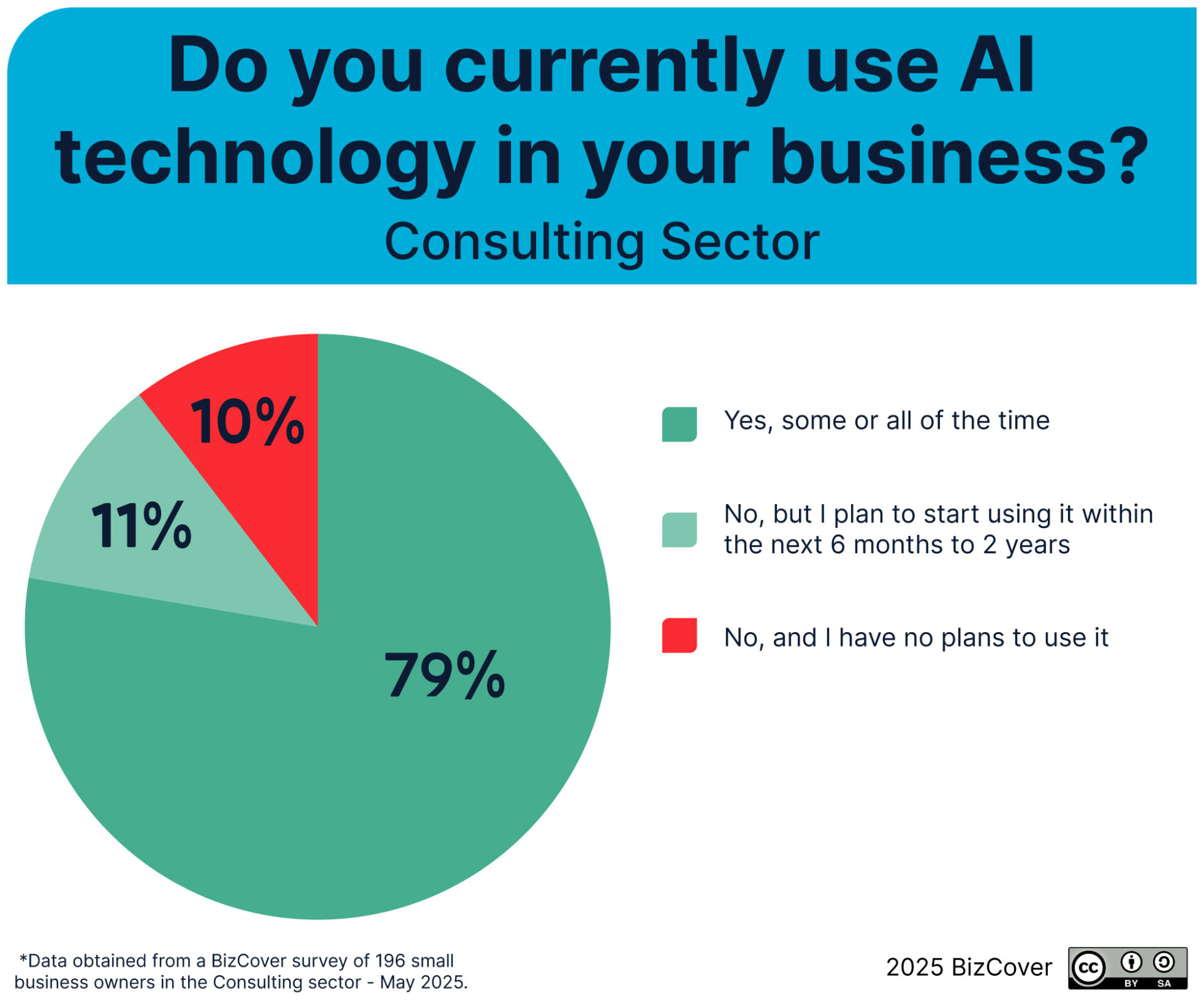
AI usage within consulting businesses
The most common applications of AI among consultants include:
- Problem-solving and decision-making support.
- Client and external communications.
- Marketing, content creation and copywriting.
This diverse use of AI reflects consultants leveraging technology to enhance both strategic and operational aspects of their businesses.
“Consultants are using AI to sharpen their thinking and save time,” Kenny observes. “It can help consultants work smarter, not harder, and deliver data-driven results to clients.”
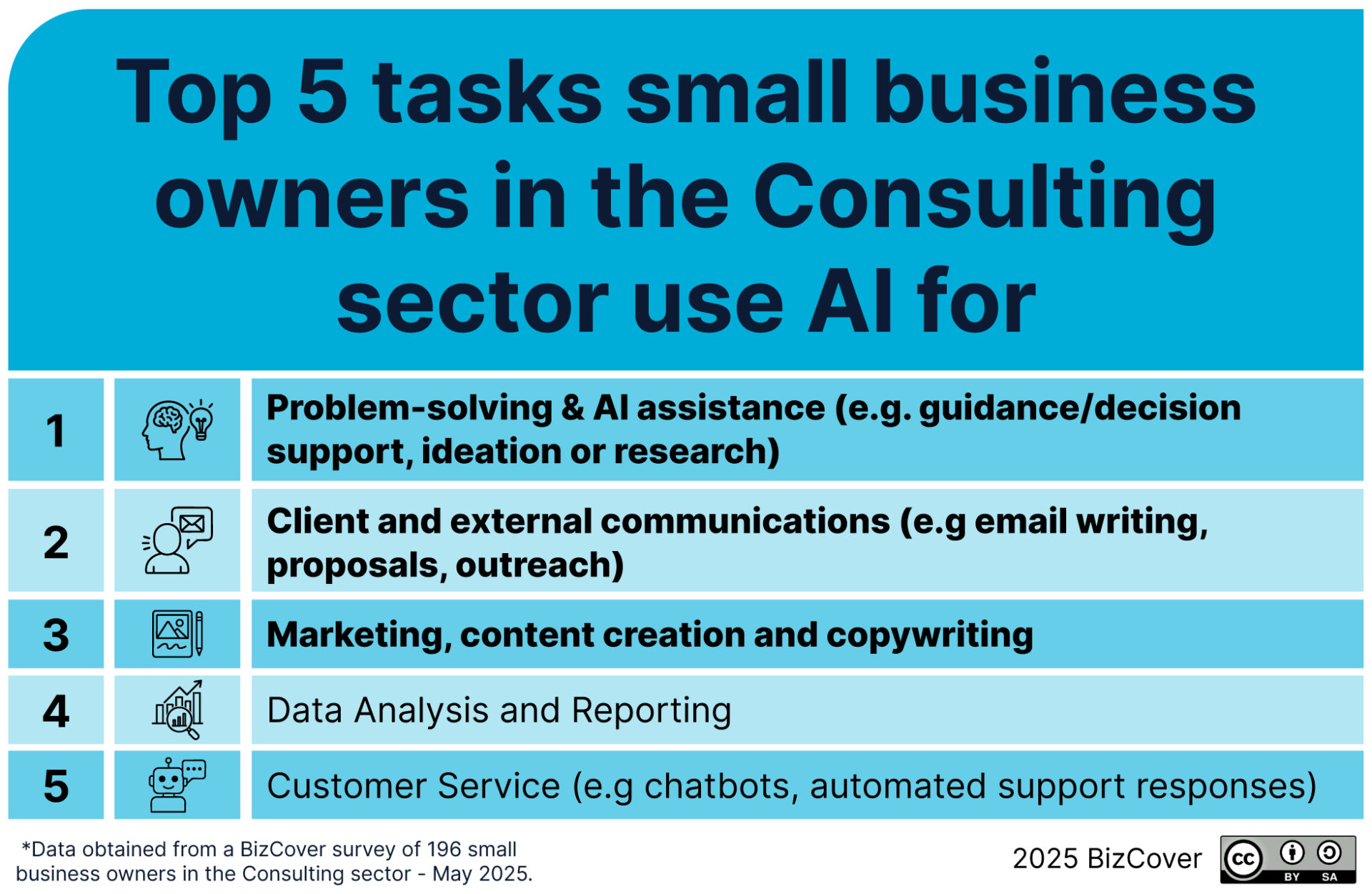
Barriers to AI adoption in consulting
Despite strong uptake overall, a small group of consultants remain cautious about fully embracing AI. Their concerns reflect the sensitive, high-trust nature of consulting work, where client confidentiality and data integrity are essential. A business’s entire reputation can be stacked on these two factors.
The top barriers to AI adoption among consulting businesses include:
- Privacy, security, and ethical concerns.
- Uncertainty about how AI works or how to apply it effectively.
- Concerns around accuracy and reliability.
“These concerns are valid,” agrees Kenny. “It’s no surprise that many consultants are being careful before fully integrating AI into their workflows.”
She continues, “For any business – especially one like consulting where client trust is everything – it’s important to balance the potential of AI and what it can do with concerns around privacy and accuracy.”
Together, these issues have contributed to a cautious cohort of “AI-hesitant” consultants. While they represent a small number within the industry, they are comfortable watching from the sidelines for now until they feel confident the technology meets their professional standards.

AI’s importance to daily operations in consulting
AI is playing a growing role in the day-to-day operations of consulting businesses, but its level of importance varies.
Three quarters (76%) of consulting firms say AI is important to their daily operations, with 17% calling it “absolutely essential.” This highlights how AI is already supporting a wide range of activities for consultants.
At the same time, 24% say AI is not important to their day-to-day work. This percentage likely includes businesses that are early in their adoption journey or prefer a more traditional, human-led approach to client services.
“These figures tell us that while AI is becoming a key part of the consulting toolkit, it’s not necessarily mission-critical for everyone just yet,” says Kenny.
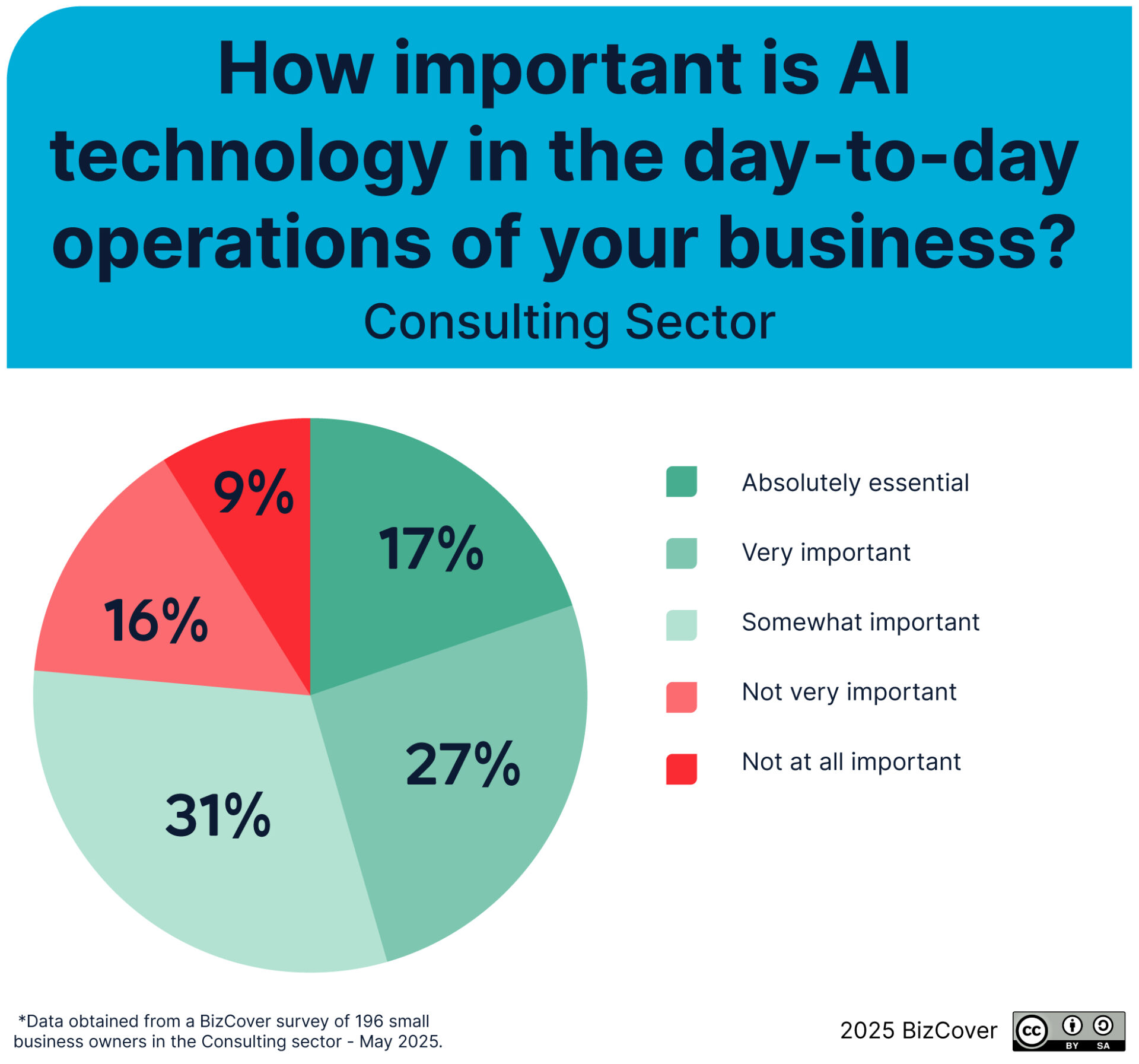
AI’s impact on skills in the consulting sector
While there are still some consultants content to watch from the sidelines, the majority of the consulting sector is gearing up for a workforce capabilities transformation.
Around 80% of consulting businesses report difficulties finding skilled professionals, with 32% saying they struggle with both hard and soft skills. Just 20% say they face no hiring challenges.
The most relied-upon skills in the sector are problem solving and critical thinking, closely followed by communication, leadership, and project management. While technical abilities like coding and cybersecurity are important, they are secondary to the interpersonal and strategic capabilities that define effective consultancy work.
To stay competitive in this fast-moving environment, consultants are proactively upskilling. Top areas of focus include:
- AI, automation and data analytics (47%).
- Digital literacy (34%).
- Creativity and innovation (33%).
“Consultants are leaning into technology not just to keep up, but to lead,” Kenny comments. “What we’re seeing is a shift toward hybrid skillsets, where human expertise is enhanced, not replaced, by AI tools.”
This skills evolution is driven by clear expectations for change. A strong 68% of consultants believe AI will create demand for entirely new skills over the next three to five years, and 57% believe it will reduce the need for some current ones. Just 3% expect no impact at all.
Kenny believes that “Firms that invest in balanced workforce development between soft and hard skills will be best positioned to thrive in the age of AI.”
Could AI replace the human workforce in consulting?
As AI becomes more capable, consulting professionals are weighing its role in the workforce.
Just over half (54%) of consultants believe AI could replace specific tasks within their business, particularly those that are repetitive, data-driven or administrative. This reflects a growing confidence in AI’s ability to support operational efficiency without replacing real human input.
A notable 27% believe AI cannot replace either tasks or roles in their business, indicating a moderate level of resistance and a strong belief in the value of human expertise, especially in client-facing and problem-solving roles.
However, 12% believe AI could replace both tasks and entire job roles. This figure shows that the majority of consultants actually see AI as a tool that can help assist, not eliminate, the human workforce.
Despite this data, 59% of consulting firms say they would consider using AI tools instead of hiring new employees or outsourcing work. Only 8% say they would never consider replacing hiring or outsourcing with AI, reinforcing the idea that most consulting businesses are open to at least experimenting with automation in the right areas.
“Consulting is still a people-first industry, but that doesn’t mean consultants aren’t embracing smart tools,” says Kenny. “AI is being viewed as a way to streamline certain functions, allowing consultants to focus on what they do best: strategic thinking and building relationships.”
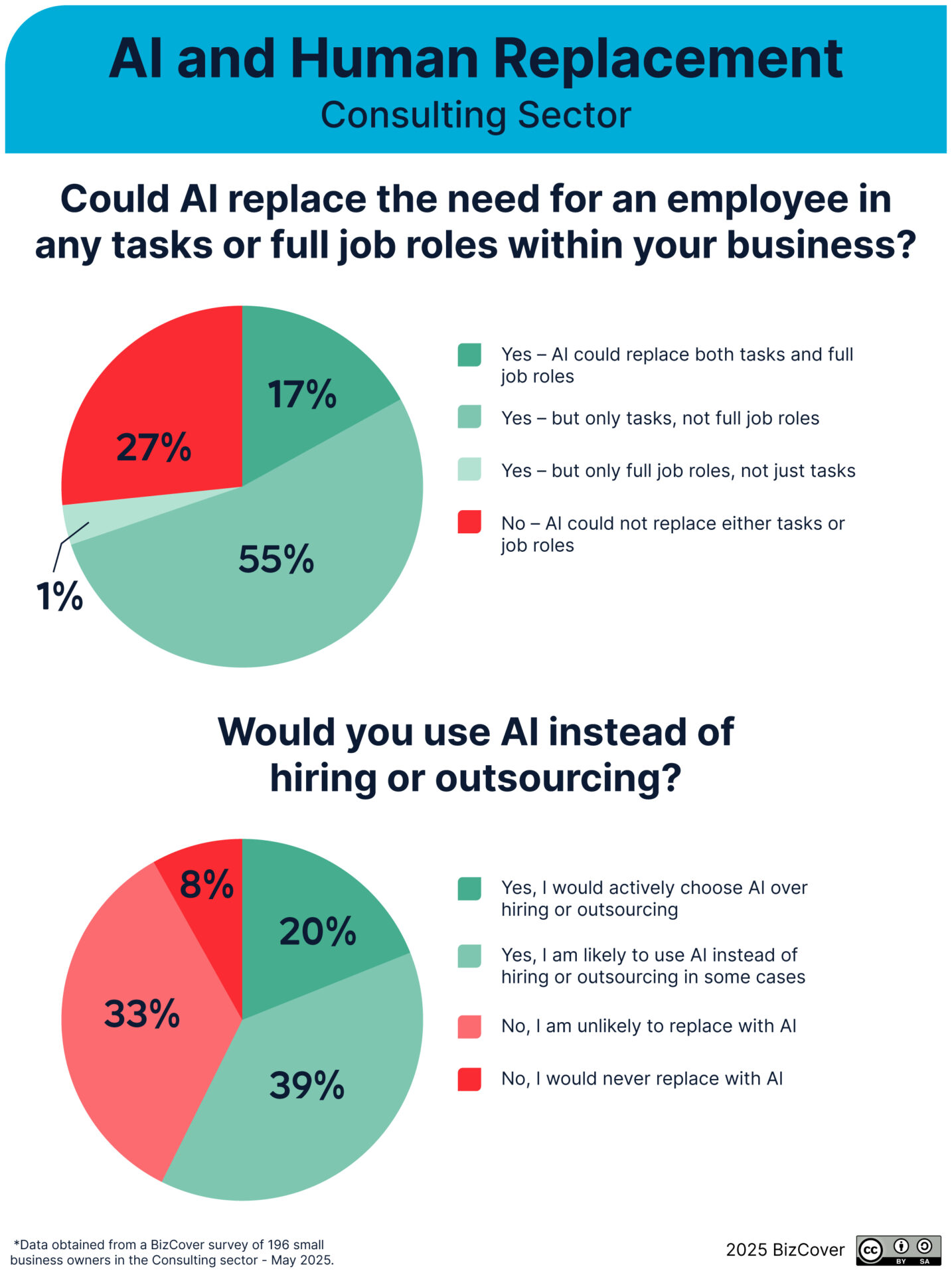
The top 5 consulting roles AI could replace
Consulting professionals are already identifying the job functions most susceptible to AI automation. According to survey results, the top roles that consultants believe AI could replace include:
- Content writers and copywriters
- Administrative assistants
- Data analysts
- Market researchers
- Business analysts.
These positions often involve repetitive, process-driven tasks, such as generating reports and written materials, managing administrative workflows, analysing datasets, conducting research and producing business insights.
The findings suggest that consultants see the biggest potential for AI in roles where efficiency and data handling are key, rather than those requiring complex human judgment or interpersonal engagement.
“As AI tools become more sophisticated, they’re being used to streamline high-volume tasks across many industries,” explains Kenny. “But in consulting, the human element still matters. Clients rely on advisors who can interpret, personalise and act on information.”
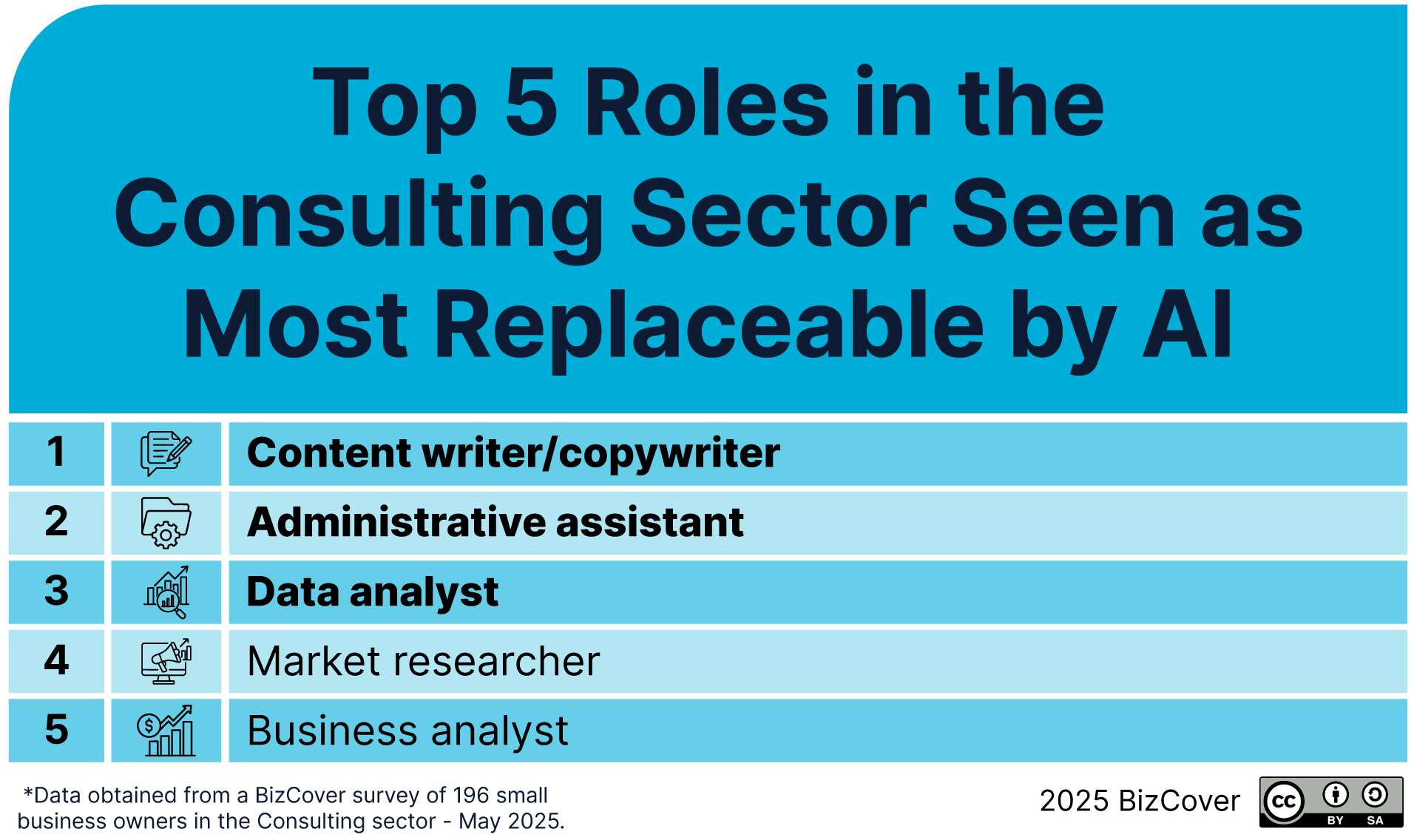
Consulting sector sentiment towards AI’s future impact
The consulting industry is largely optimistic about how AI will shape future careers and skillsets.
Three in four consulting professionals (75%) express a positive outlook on AI’s impact. Of these, 43% feel very positive, seeing clear opportunities to grow and adapt, while 32% feel somewhat positive, actively working to stay ahead of emerging trends.
A further 13% remain neutral, expecting AI to have limited or no effect on their roles.
Just 12% of respondents feel negative about AI’s impact, with 11% expressing concern about staying relevant and 1% fearing their skills may become obsolete. This is a relatively low number of anxious workers compared to other industries.
“These numbers show that consultants are embracing AI with open eyes,” says Kenny. “There’s a real focus on growth and upskilling, not fear. That forward-looking mindset is what will keep the consulting sector resilient as we continue to watch new technology evolve.”
When asked, “How do you see AI changing the skillsets required for businesses in the next 3–5 years?”, 68% of consulting professionals said they expect AI to create demand for entirely new skills. Only 3% anticipate no change.
“The consulting sector is one that recognises both the challenges and opportunities AI presents,” Kenny says. “With a very high adoption rate and mainly positive sentiment around AI, the industry is making sure its well prepared for the future.”
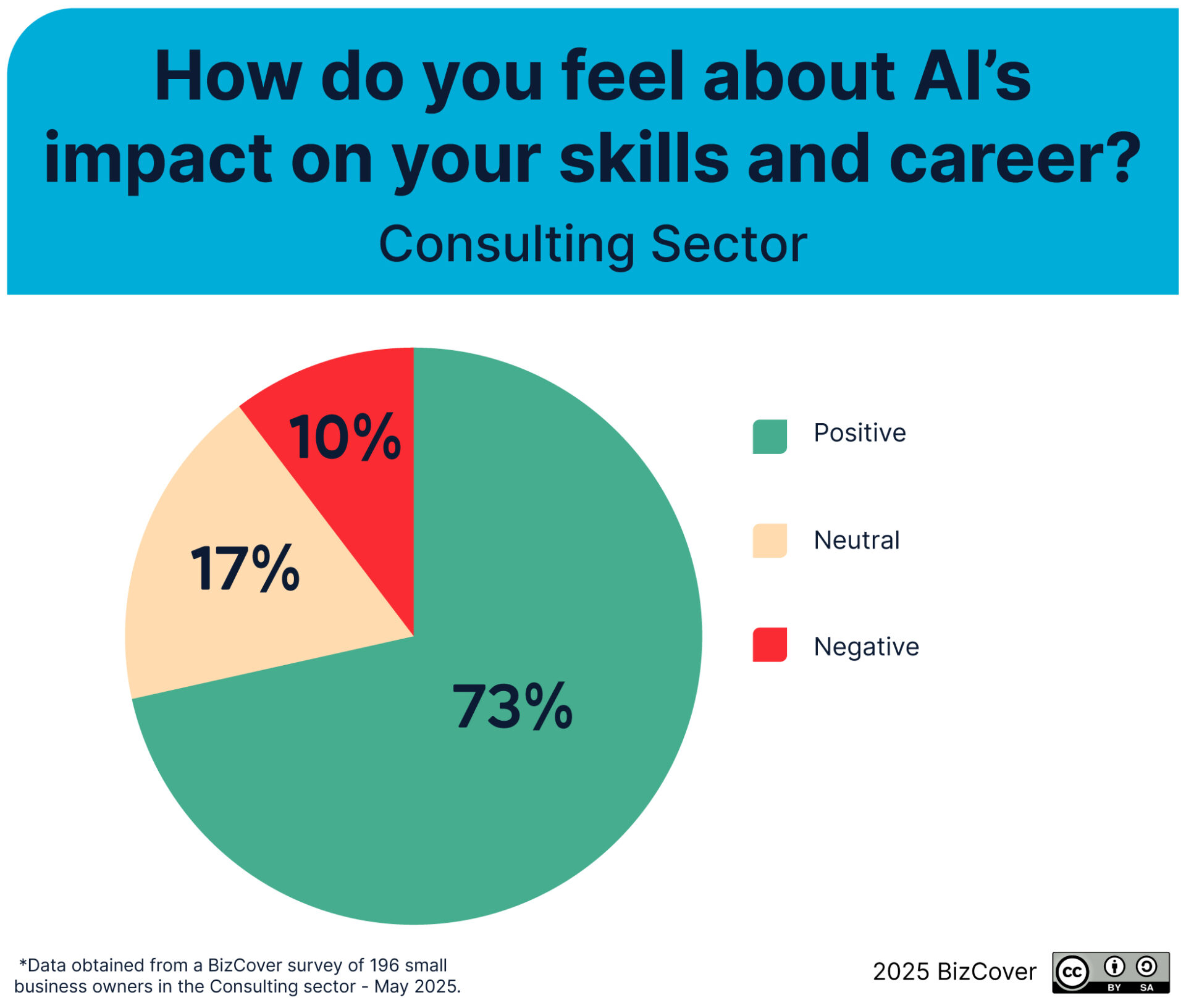
Conclusion: Human experience and interpersonal skills still highly valued in the consulting sector
AI adoption among small consulting businesses in Australia is already strong, and it’s steadily growing. 90% of firms are already using AI or planning to within the next two years. Consultants are increasingly integrating AI to assist with decision-making, client communications, data analysis and administrative workflows.
At the same time, consulting professionals remain cautious about issues like data privacy, accuracy and ethical use. These concerns highlight the need for clear guidance and frameworks to ensure AI is implemented responsibly.
Rather than replacing human roles, AI is largely seen as a supportive tool in the sonsultancy sector. Consultants believe that it is best suited to automating routine, data-heavy and time-consuming tasks. Strategic thinking, problem-solving, leadership and client relationship management remain firmly in the domain of human professionals.
“Consulting is still very much a people-first industry,” states Kenny. “AI is proving to be a powerful asset, but it’s the consultants who understand how to blend technology with human judgement that will thrive.”
Overall, the consulting sector is largely optimistic about AI’s potential to boost productivity, improve service delivery, and strengthen decision-making, all while keeping human expertise at its core.
Need help navigating change or protecting your consulting business? BizCover makes it fast and easy to compare business insurance quotes online. For on the go cover, go BizCover.
Find more data from small businesses across all sectors in The Australian Small Business AI Report 2025.
Methodology
This research was conducted via an online survey distributed to Australian business owners in April 2025. A total of 1,323 responses were collected. For the purposes of this analysis, only responses from small business owners (defined as those with 20 or fewer employees) were included, bringing the final sample size to 965.
These respondents represented seven industries, after excluding two industries with low response rates (fewer than 50 responses each) to ensure meaningful comparison. The remaining industries include Marketing and Communications, Consulting and Strategy, ICT, Healthcare and Medical, and others. There were 196 respondents from the Consulting sector.
This information is general only and does not take into account your objectives, financial situation or needs. It should not be relied upon as advice. As with any insurance, cover will be subject to the terms, conditions and exclusions contained in the policy wording or Product Disclosure Statement (available on our website). Please consider whether the advice is suitable for you before proceeding with any purchase. Target Market Determination document is also available (as applicable). © 2026 BizCover Pty Limited, all rights reserved. ABN 68 127 707 975; AFSL 501769.


![[Press Release] BizCover Shortlisted for 4 Excellence Awards by Insurance Business Australia in 2026](https://www.bizcover.com.au/wp-content/uploads/Press-Release-BizCover-Shortlisted-for-4-Excellence-Awards-by-Insurance-Business-Australia-in-2026.jpg)

![[Press Release] Extreme weather poses growing threat to Australian businesses as storm and fire season approach](https://www.bizcover.com.au/wp-content/uploads/Press-Release-Extreme-weather-poses-growing-threat-to-Australian-businesses-as-storm-and-fire-season-approach-1.jpg)